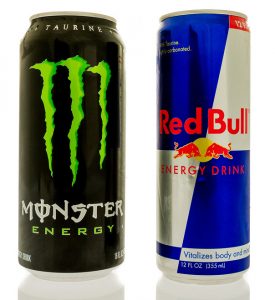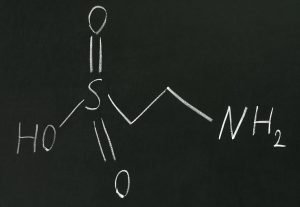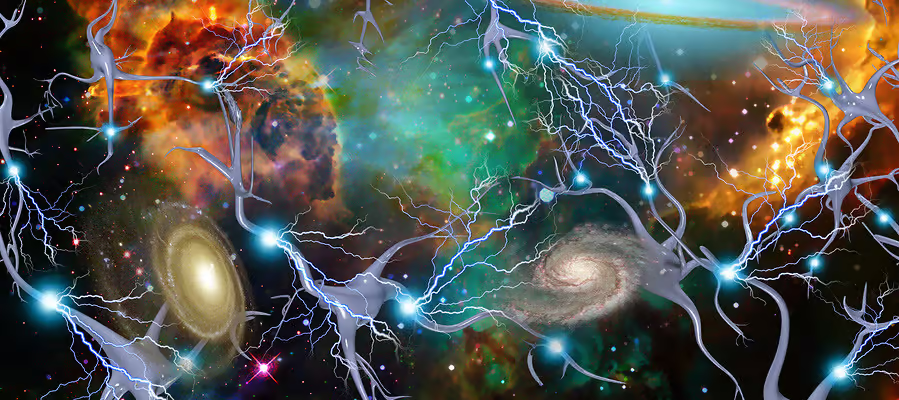Table of Contents
Key Takeaways
- Taurine, an abundant amino acid found in various tissues of the body, can be safely added to a nootropic stack, and its association with energy drinks is distinct from its nootropic benefits.
- As a nootropic, taurine functions as a neurotransmitter, protects brain cells, promotes neurogenesis, and supports memory and mood.
- Taurine may positively impact anxiety, depression, and ADHD by influencing brain signaling and inflammation regulation.
- Taurine shows potential therapeutic benefits for conditions like autism, OCD, and epilepsy, though individual responses may vary.
- The recommended daily dosage of taurine as a nootropic supplement is 500 mg – 2 grams, and it is generally safe, with minimal side effects.
Taurine (2-aminoethane-sulfonic acid) is one of the most abundant amino acids in your brain, spinal cord, eyes, and nearly every tissue in your body.
Every region of your brain including the retina in your eyes contains or takes up the amino acid taurine.
 You may be familiar with taurine only because it’s a featured ingredient in popular energy drinks like Red Bull, Rock Star, NOS, Amp, Full Throttle, and Monster.
You may be familiar with taurine only because it’s a featured ingredient in popular energy drinks like Red Bull, Rock Star, NOS, Amp, Full Throttle, and Monster.
Occasionally we’ll see a story about sudden death or seizure from consuming as few as 3 – 4 cans of some energy drink. And because taurine is the featured ingredient many assume that taurine is the problem.
Turns out that adding taurine to your nootropic stack is perfectly safe. The hidden issue often missed in the news is energy drink caffeine content ranging from 80 – 300 mg per can.[i]
Everyone from athletes to exhausted soccer moms grab a Red Bull® to improve performance and make it through their day.
But a better option is to avoid the sugar-laden energy drink. And stack a taurine supplement with a cup of coffee or green tea. For a similar effect. Without the negatives.
In this review we’ll dive into all the of the nootropic benefits provided by supplementing with taurine.
Taurine helps:
- Neurotransmitters. Taurine functions as a neurotransmitter and neuromodulator in your brain. Activating GABA and glycine receptors which affects memory and mood and prevents seizures.[ii]
- Neuroprotectant. Taurine protects brain cells by reducing intracellular free calcium (Ca2+) concentrations.[iii] It is a potent antioxidant, protects from mitochondrial dysfunction, modulates energy metabolism within cells, modulates genes to induce longevity, inhibits cellular stress associated with Alzheimer’s, acts as ‘quality control’ in brain cell health, and protects against stroke.[iv]
- Neurogenesis. Taurine increases stem cells and progenitor cells (neural precursor cells) in your brain including the aging hippocampus and increases the survival of newborn neurons (neurogenesis).[v]
What is Taurine?
Taurine (2-aminoethane-sulfonic acid) is one of the most abundant amino acids in your body.
Taurine is synthesized in your body from methionine and cysteine via cysteinesulfinic acid decarboxylase (CSD).[vi]

Taurine is a “conditional” amino acid because some of this amino acid is synthesized naturally in your body. And you get the remaining taurine your body requires from eating seafood, meat, poultry, and eggs.
Taurine was discovered by German scientists Friedrich Tiedemann and Leopold Gmelin in 1827 who first extracted it from ox bile. It’s named after the Latin taurus which means bull or ox.
Since taurine is found almost exclusively in animal-based foods, many vegans and vegetarians are at risk for taurine deficiency.[vii]
Science also shows that taurine levels decline with age.[viii] Possibly because the aging body and brain cannot supply enough of the precursors required to synthesize taurine.[ix]
The structure of taurine has two primary differences from essential amino acids.
First, taurine’s amino group is attached to a beta-carbon instead of an alpha-carbon. And second, the acid group in taurine is sulfonic acid, instead of carboxylic acid like in other amino acids.[x]
Because of this distinctive structure, taurine is not used in the synthesis of proteins in your body and brain. Instead, it provides a host of other benefits which we’ll cover in this review.
The more we learn about taurine, the more we realize it is one of the most essential substances in the human body.
After extensive animal studies showing all the benefits of taurine, scientists in Japan were curious if there was a correlation in human health.
Using data from a WHO study covering 61 populations in 25 countries they confirmed that populations with the highest levels of taurine in their system lived the longest.[xi]
As a nootropic, taurine is essential for minimizing damage from beta-amyloid proteins associated with Alzheimer’s, protecting against environmental toxins, preventing mitochondrial dysfunction, and supporting the inhibitory GABA system.
Taurine is needed for promoting long-term potentiation for memory formation, reducing brain inflammation, stimulating growth of new neurons (neurogenesis), and protecting your brain from the damaging effects of stroke.
How does Taurine work in the brain?
Taurine boosts brain health and function in several ways. But two in particular stand out.
- Taurine may help anxiety and depression. If you deal with anxiety or depression you know the negative effects on learning, work and your quality of life. Supplementing with taurine as a nootropic may help.[xii]
Research shows that taurine may help alleviate depression by changing depression-related signaling cascades in the hippocampus.[xiii]
One human study with 121 bipolar patients aged 18 – 25 demonstrated a reduction in manic episodes when supplemented with taurine.[xiv]
And several animal studies have shown taurine nootropic supplementation may help in the clinical treatment of anxiety. By modulating the GABA and glycine receptors in the brain. And preventing neurotoxicity and mitochondrial energy failure.[xv]
- Taurine is anti-aging. Studies show that taurine levels fall as you get older. And supplementing with taurine seems to slow the brain aging process.[xvi]
Taurine protects brain cells from pesticides and heavy metals such as lead.[xvii] It helps prevent mitochondrial dysfunction and regulates calcium levels.[xviii] And taurine prevents toxicity by reversing declines in the inhibitory GABA system.[xix]
Taurine supplementation reduces inflammatory processes caused by excessive iron accumulation that can lead to Alzheimer’s and Parkinson’s.[xx] And it stops Amyloid-β from damaging mitochondria by activation of the SIRT 1 gene which helps prevent Alzheimer’s.[xxi]
Taurine also plays a critical role in creating new brain cells (neurogenesis). Research has found that taurine activates dormant stem cells in the brain.[xxii] And boosts the survival of new neurons which results in an increase in adult brain cells.
How things go bad if you are low in Taurine
Some taurine is produced in your body from methionine and the amino acid cysteine. But the remainder must come from your diet. If you are vegan or vegetarian, chances are high that you are not getting enough taurine.
Diseases such as diabetes, cancer, liver disease, kidneys or heart can also deplete taurine. As can deficiencies in Vitamin B6 (P-5-P), zinc, magnesium and Vitamin A. And eating food containing monosodium glutamate (MSG).
Insufficient taurine means:
↓ reduced GABA can lead to anxiety and depression
↓ vision problems
↓ oxidative stress destroys neurons and synapses in the central nervous system
↓ insulin resistance
↓ Brain-derived neurotrophic factor (BDNF) declines
Taurine is one of the least expensive nootropic supplements there is. So if there the slightest doubt you are getting enough taurine then add it to your nootropic stack.
Taurine benefits
Taurine is the most abundant amino acid that you’ve never heard of. Strong evidence suggests taurine could be the secret factor in the world’s longest-living populations.[xxiii]
Studies show taurine:
- Critical for normal human brain development[xxiv]
- Prevents mitochondrial dysfunction within brain cells
- Supports GABA in your brain preventing neurotoxicity & stress
- Reduces inflammation that can lead to Alzheimer’s and Parkinson’s
- Stimulates neurogenesis which is anti-aging
- Shields brain cells from stroke-induced brain cell damage
- Prevents beta-amyloid damage that could lead to Alzheimer’s
- Protects brain cells from heavy metals and pesticides
- Needed along with NMDA and dopamine receptors for long-term potentiation needed for long-term memory formation[xxv]
And here we’re only investigating taurine’s effects on your brain. This essential amino acid can also restore insulin sensitivity, mitigate diabetic complications, reverse symptoms of heart disease, prevent and treat fatty liver, and reverse tinnitus.
If you are interested in living a longer, healthier and more active life, consider adding taurine to your nootropic stack.
How does Taurine feel?
 Neurohackers report that supplementing with taurine is a simple way to support energy levels.
Neurohackers report that supplementing with taurine is a simple way to support energy levels.
Sleep is better, and taurine may be a safe alternative to prescription sleep meds.
Most people using taurine report sharper eyesight. Muscle pain is reduced, less depression, and no more insulin resistance.
Some report that adding taurine to their nootropic stack helped relieve chronic fatigue syndrome.
Supplementing with taurine may reduce blood pressure and is effective in reducing the occurrence of atrial fibrillation.
If you have issues after eating food containing monosodium glutamate (MSG), taurine can help eliminate the headache and nausea.
Taurine Clinical Research
Taurine for autism
Autism spectrum disorder is thought to be associated with oxidative stress caused by reactive oxygen species (ROS). So oxidative stress could be a potential target for therapeutic intervention for autism.
Methylation capacity, sulfate levels, and total glutathione levels are decreased in autism. On the other hand, oxidative glutathione and the ratio of oxidative to reduced glutathione are increased.
So decreasing oxidative stress might be a potential treatment for autism.[xxvi]
Taurine is a well-known antioxidant and regulator of inflammation. Researchers in New York tested 66 children aged 1.5 – 11.5 years who were diagnosed with autism. And the controls in this study were the kids’ healthy siblings and parents.
The study found that 21 out of 66 autistic children had low taurine concentrations. The researchers concluded the data implied that taurine may be a valid biomarker for at least some with autism.[xxvii]
Taurine may help ADHD
Studies have shown low dopamine uptake in the prefrontal cortex and striatum segments of the ADHD brain.
A very recent study conducted in Taiwan revealed that high-dose taurine calmed hyperactive behavior and brain signaling in ADHD rats.
Taurine significantly affected dopamine transporter levels, dopamine uptake and brain-derived neurotrophic factor (BDNF) expression.[xxviii]
Mounting evidence in ADHD research also suggests a strong relationship between inflammation and ADHD.
Elevated levels of inflammatory cytokines such as interleukin (IL)-1 and C-reactive protein are turning out to be diagnostic markers of ADHD. These cytokines induce changes in dopamine and norepinephrine in the prefrontal cortex.
A recent study in Taiwan showed that high-dose taurine significantly reduced interleukin (IL)-1 and C-reactive protein which in turn reduced hyperactive behavior.[xxix]
Taurine for OCD
Studies show that patients with OCD have increased glutamate activity and decreased GABA in the brain. And it could be genetic.
One specific gene (SLC1A1) codes for transporters to clear excess glutamate from synapses, and boost GABA production.[xxx] If you are missing this gene you’ll have problems with glutamate and GABA and likely experience symptoms of OCD.
GABA plays a critical role in regulating excitability in neuronal networks in your brain. Taurine has been proven to activate GABA receptors and even boost GABA levels in your brain.[xxxi] Helping to reduce symptoms of OCD.
Taurine for epilepsy
Read the reviews of taurine supplements and now and again you’ll see someone mention that consistent use of taurine reduces the severity and number of seizures they experience.
Imbalances between excitatory and inhibitory neurotransmitters appear to be the mechanism of epileptic seizures. And taurine serves as an inhibitory neuromodulator.
GABA is the primary inhibitory neurotransmitter in your brain. So the regulation of GABA plays a prominent role in preventing excitability and seizures.
Taurine is a GABAA receptor agonist. High-doses of taurine activate this receptor as well as the glycine receptor which both suppress neuronal firing.
Several clinical studies have been conducted to test the efficacy in using taurine to control epilepsy. Reviews are mixed as only about 1/3 of patients respond favorably to taurine therapy.[xxxii] So if you’ve tried everything else with little success you may want to give taurine a try.
Taurine Recommended Dosage
Recommended taurine nootropic dosage is 500 mg – 2 gm per day.
The safe upper limit for taurine is 3 gm per day.[xxxiii]
Instead of getting your taurine from an energy drink, try a taurine supplement with a cup of coffee or tea, and a high-quality BioActive B-Complex supplement. You’ll feel better and get the same benefit.
Taurine is rapidly absorbed and used in your body and brain. But studies show that a single dose won’t do much in providing a benefit you can feel.
Continual, daily, long-term nootropic usage of taurine builds and then maintains adequate levels of taurine in your system.[xxxiv]
With very few exceptions, high doses of taurine are well tolerated without adverse side effects.[xxxv]
Taurine Side Effects
The effects of taurine are well-tolerated and safe for most people. And should not cause any side effects.
High taurine dosage should be avoided if you are dealing with bipolar disorder because it could make your symptoms worse.
Best Type of Taurine Supplements to buy
Taurine is available in capsules and powder form.
Taurine capsules are usually 500 or 1000 mg each.
Avoid trying to get your taurine from energy drinks because the dose is too low for any nootropic benefit. And they are loaded with sugar, caffeine, and other ingredients that are contrary to good health.
I recommend: Life Extension – Taurine
Nootropics Expert Recommendation
I recommend using taurine as a nootropic supplement.
Your body does make some taurine on its own. But the rest must come from meat, poultry, seafood or dairy. Or a nootropic supplement.
Taurine is especially helpful for relieving mental health issues like anxiety, stress, and panic disorder. If you haven’t had much luck with prescription anti-anxiety meds or antidepressants, or other nootropics for anxiety, you may want to try taurine.
For antiaging benefits, and a longer, healthier life you should add taurine to your nootropic stack.
Taurine is essential for a healthy brain, heart, muscles, eyes and hearing.
Taurine is particularly effective for those using levodopa to treat Parkinson’s Disease because this drug depletes taurine in your body.[xxxvi]
Doctors sometimes recommend dosages of taurine up to 6 grams per day for treating high blood pressure, diabetes, congestive heart failure, anemia, cystic fibrosis and after surgery.
But for most neurohackers, up to 2 grams per day of taurine is adequate.
Just avoid trying to get your daily taurine dose from energy drinks. The dose is too low and the risk from the other ingredients in these drinks is too high.
I recommend: Life Extension – Taurine










Join The Discussion - 207 comments
SHARON
July 5, 2025
will taurine make too much glutamate, i have to watch with that . thx sharon
David Tomen
July 5, 2025
Sharon, Taurine does not “make” glutamate. Please re-read my review above for its exact mechanism of action.
Amber
June 23, 2025
Hi,
I was on lamictal and it greatly helped w my food cravings as well as a hair twisting (in the same family as trichotillomania/hair pulling).
Which allowed me to get to a healthy weight and prevented hair loss.
Didn’t do anything for depression though.
However I had to stop taking it due to chronic yawning when I had to increase the dose due to tolerance.
I read that the reason the med could help w these compulsive issues is that it acts as a glutamate inhibitor/antagonist.
So then I read that taurine could possibly do this.
I know I’ve tried taurine in the past but I can’t remember how much I took or why I stopped taking it.
I’ve tried NAC but I developed a tolerance to it and stopped taking it.
I was wondering if you may have any other suggestions?
I’ve gained almost all the weight back over the last several years. Mainly due to the inability to conquer my compulsive behaviors. Therapy just isn’t enough.
I grieved when I had to stop taking lamictal medication. It was so helpful while it lasted.
I really need to get back to a healthy weight but it feels impossible.
Thanks!
David Tomen
June 24, 2025
Amber, scroll back up to the section called “Taurine for OCD“. It is not a glutamate inhibitor/antagonist which does not make sense anyway. It can’t both. It’s either one or the other but in this cause with Taurine it’s neither.
Szilvia
May 13, 2025
Dear David!
Can magnesium taurate, or taurine, be taken with Valium?
Thank you very much for your help!
David Tomen
May 14, 2025
Should not be a problem.